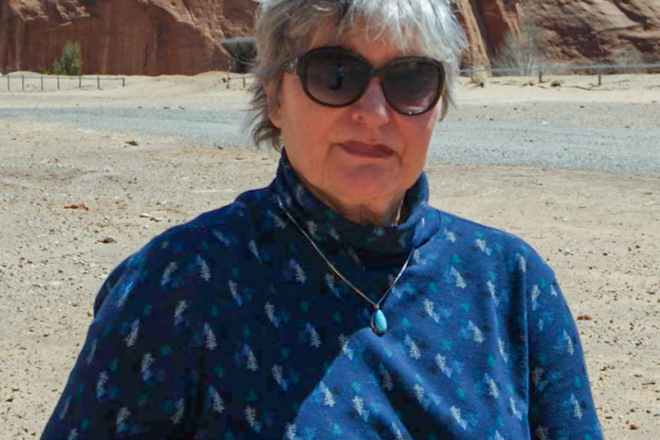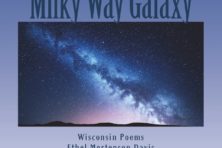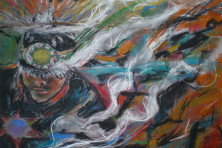Peninsula Poetry: Ethel Mortenson Davis
- Share
- Tweet
- Pin
- Share

Ethel Mortenson Davis of Sturgeon Bay grew up on a dairy farm in Marathon County and trained as an artist at UW-Madison. Her poetry is intensely visual, demonstrating the same life, color and movement of her pastels.
She’s had seven books published; her art has appeared in literary magazines and galleries; and she’s a member of several poetry groups. In 2018, the Wisconsin Library Association honored her book Under the Tail of the Milky Way Galaxy as an Outstanding Achievement in Poetry by a Wisconsin Poet.
Davis is co-editing the Wisconsin Fellowship of Poets’ 2023 Wisconsin Poets Calendar with her husband, Tom Davis; and Door County’s poet laureate, Mike Orlock. She co-owns and co-manages the Four Windows Press publishing company in Sturgeon Bay.
What’s your writing routine?
I keep a journal close to me so I can write down ideas, pictures of ideas and words for poems that I want to create. Sometimes I wake up in the middle of the night and, for some reason, must write. So I get up and start a poem. I find it inspiring to write in the middle of the night.
I also love to walk, and I get lots of ideas while walking in Potawatomi State Park. Just the way the light affects the landscape, or seeing wildlife in clearings, along the shore, or in the trees can be an inspiration for a poem. I also love to write early in the mornings.
What do most poorly written poems have in common?
They lack inspiration because they don’t take the reader on a journey. Poetry should have great meaning without just saying. Poetry should not be small. It should have a largeness to it that is not a cliché. It should also be condensed and well thought out.
What do most well-written poems have in common?
They should tell a story. They should have mystery and great meaning, and show us a different place – a place where we have never been before.
Is it important to understand the meaning of the poem or for the reader to be able to “solve” it?
Not all poetry needs to be obvious on its face. It can be beautiful and mysterious and have truth in it. There are different meanings in our lives.
Some of them we can understand without intellectual knowing. It’s like looking at an abstract painting: We don’t necessarily understand the content, but it can give us a feeling, a look, an inspiration that moves us.
What book are you reading right now?
I am reading Vesper Flights by Helen Macdonald and An Artist of the Floating World by Kazuo Ishiguro, the British author who won the Nobel Prize.
Peninsula Poetry is a monthly column curated by the Door County Poets Collective, a 12-member working group that was formed to publish Soundings: Door County in Poetry in 2015 and continues to meet.
Home A Norwegian walked across Antarctica. He said to embrace the silent, white landscape and black, starry night. Your cells come out of you, he said, and become one with the wilderness. Like the caged bird that wants to go home, we need to return to our wilderness, our home. We’ve been gone a long time.
I Will Wait I will wait for the foxfire tonight, for the glistening jewels of the wood. I will nuddle along the lopeway, following the gallery worn in paths by the deer. I will nudge the white dag that sits on top of the marsh, she, a low-lying friend.
Presentation The young father bound his newborn daughter across his chest and then slipped on his skis. This was a cold February in the land of lakes and trees with dancing green lights. Here he connected, just as his ancestors before him connected, to the starry night, just as his daughter will someday bind her infant across her heart, presenting a new life under the milky-green foam of stars, under the great tail of the Milky Way Galaxy above her shoulders.
The Slowing There comes a time, when there is a slowing, when the snow is too heavy and too deep, when I cannot put the black harness on the back of my little horse, so, I must walk it back to the tack-room through thigh-high drifts, and that is when I catch a glimpse of her through the open barn door. She is munching a mound of hay from last summer’s days, and it is the sound of happiness.
Song of Ecstasy She is the sort that hears the song the hills make after a heavy rain— a humming sound one hears first through the fingertips, then the ears. She’s the sort that dances with antelope at dusk, playing in the field until dawn. She’s the sort that makes the insect song — not bell, nor click, but a rhythm in-between: like the sound the silver pieces sewn on her dress and leggings make, a sound like wind and bell, as she makes her grand entry in a circle around the village — head held high, her hair flowing behind her — tasting the song of pure ecstasy like honey on the tongue.


